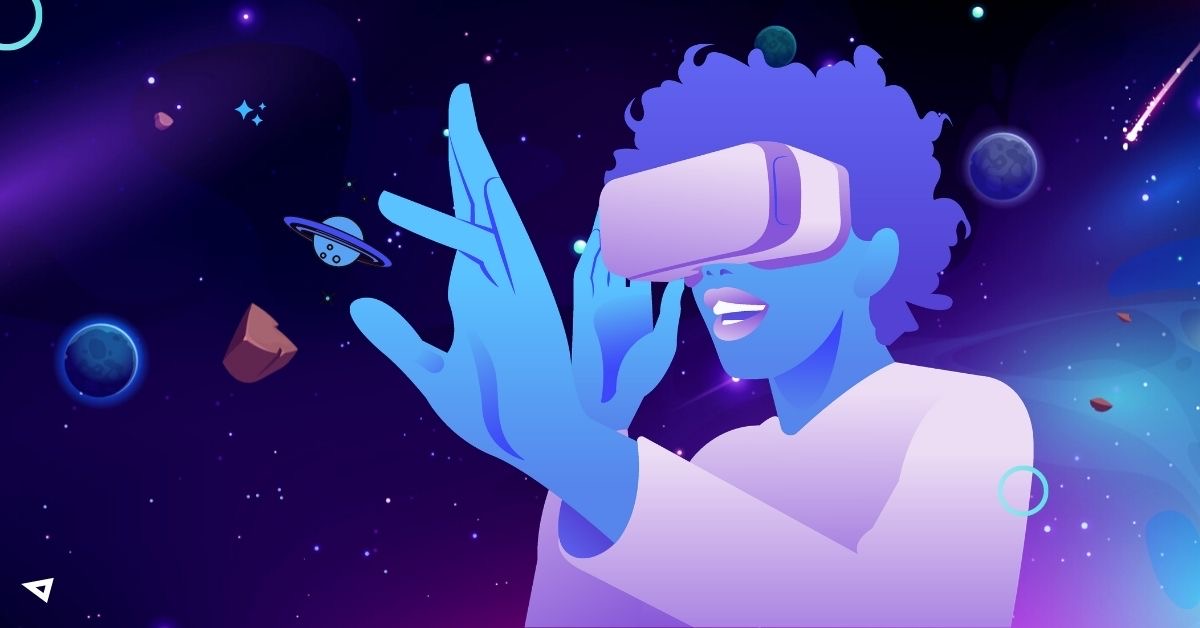Virtual Reality is the simulation of a real-life environment. It is more like seeing an imaginary world with eyes wide open. The technology enables you to create a virtual world of your choice with giant robots, dinosaurs, and whatever you want in it. Though you are aware it is virtual, the VR technology gives the experience much closer to Reality. It can be experienced with devices like special goggles, phones, and headsets. Virtual reality applications are expanding across all vertices such as entertainment, e-commerce, etc. It is anticipated that VR will grab an indispensable role across all industries due to its ability to offer a more interactive and engaging experience.
Virtual Reality (VR) use-cases for business
Since the outbreak of COVID 19, people have refrained from venturing out of their homes. Subsequently, this has affected the B2C businesses to a greater extent. Hence, this has resulted in a surge in online sales. People who don’t even prefer making online purchases are prompted to do it due to the current situation. So, companies can take advantage of Virtual Reality to provide a real experience to its customers. For instance, Sephora, a leading beauty product brand, utilizes VR, which helps it to enhance its online sales. If you like an eyeliner from their online store, you can try it virtually and conclude whether it matches your skin tone. Its VR scans your whole face and then applies the eyeliner chosen by you on your face. It is almost similar to applying eyeliner by staring at the mirror. Thus, purchasing decisions have been made easier with virtual Reality.
According to Search Engine Journal,
“Virtual reality (VR), augmented reality (AR), mixed reality (MR), machine learning, and now virtual beings are all terms digital marketers need to become familiar with sooner than later. They have quickly become one of the most accessible ways to market, communicate, engage, and teach”.
It’s no wonder that numerous digital marketing agencies, irrespective of their level, have employed VR and related technologies for precise targeting and delivery of messages. And there are various digital marketing agencies like Trollishly, that help their clients craft effective campaigns by incorporating virtual reality. Many event marketing tools, especially after COVID-19 are building real-like experiences using virtual reality.
IKEA, one of the leading home accessories and furniture companies with its stores spread across various countries, also utilizes virtual Reality to keep up its business. Its application lets you try the furniture and other home accessories that are available in its online store. You can place them virtually at any location in your home or office. Such moves will let you find whether a sofa matches your home’s aesthetics and whether the space occupied by it doesn’t cause any disturbance etc.
The online sales graph is rising steadily every year. The advent of Virtual Reality can offer a real shopping experience to a certain extent though not completely. However, it has eased the process of decision making regarding buying products among consumers. If you are a B2C business, you must focus on incorporating this technology into your online business. Because if your competitor utilizes VR and you didn’t, chances are high for people to choose him over you. Thus, the Virtual Reality business is going to gain center stage in the coming years.
Virtual Reality In Gaming Industry:
Virtual Reality is taking the gaming industry to new levels. The capability of VR to provide a more realistic and engaging experience to gamers has made it to gain an indispensable place in the gaming industry. Virtual Reality gaming has its separate fanbase. When the Pokemon VR game was introduced back in 2016, it took the world by storm. Generation Z and even adults downloaded the game, and they roamed in streets looking for virtual poke balls.
The game garnered massive attention that it even made it to the headlines in the news. In 2016, Pokemon Go had the highest average time spent on a mobile application by an IOS user. It attained this position by outpacing Facebook and Snapchat as they had a tight hold of Generation Z at that time. The average time spent by IOS users stood at 33 minutes, followed by Facebook with 22 minutes. Playstation has also taken advantage of VR by launching its headset PlayStation VR that has been completely dedicated to VR games. It has also introduced a slew of VR games such as Iron Man VR and Batman Arkham VR. As noted by NewGenApps, the VR game users are expected to grow to 216 million by 2025.
Virtual Reality Startups
The application of Virtual Reality is increasing across all sectors. This has led to the rise of many startups focussed on a particular sector. SmartvizX is a VR startup concentrating on architectural and interior design. Right after creating a complete plan for a building, Smartviz will virtually create both the building’s interior and exterior with fine details. It takes people into their dream house through Oculus Rift VR headsets and other notable applications. The visuals it brings in front of the viewer’s eyes by creating a virtual interactive environment has driven many projects to this startup.
Since it can provide a real living experience virtually before even a building is built, people can suggest modifications so that they don’t have to waste money and time once it is built. The company is piling up many projects since it can provide a real living experience before making an investment and building a house or a building.
Wrapping Up…
Research into virtual Reality is going at a fast pace. Thus, we can witness more advancement in the coming years, and it could deliver a more engaging experience than it is today. Today, VR is being utilized in all vertices. In the educational field, this technology is used to demystify the complex concepts for the students. Thus, the VR industry will garner an inseparable place for it in the coming years.





